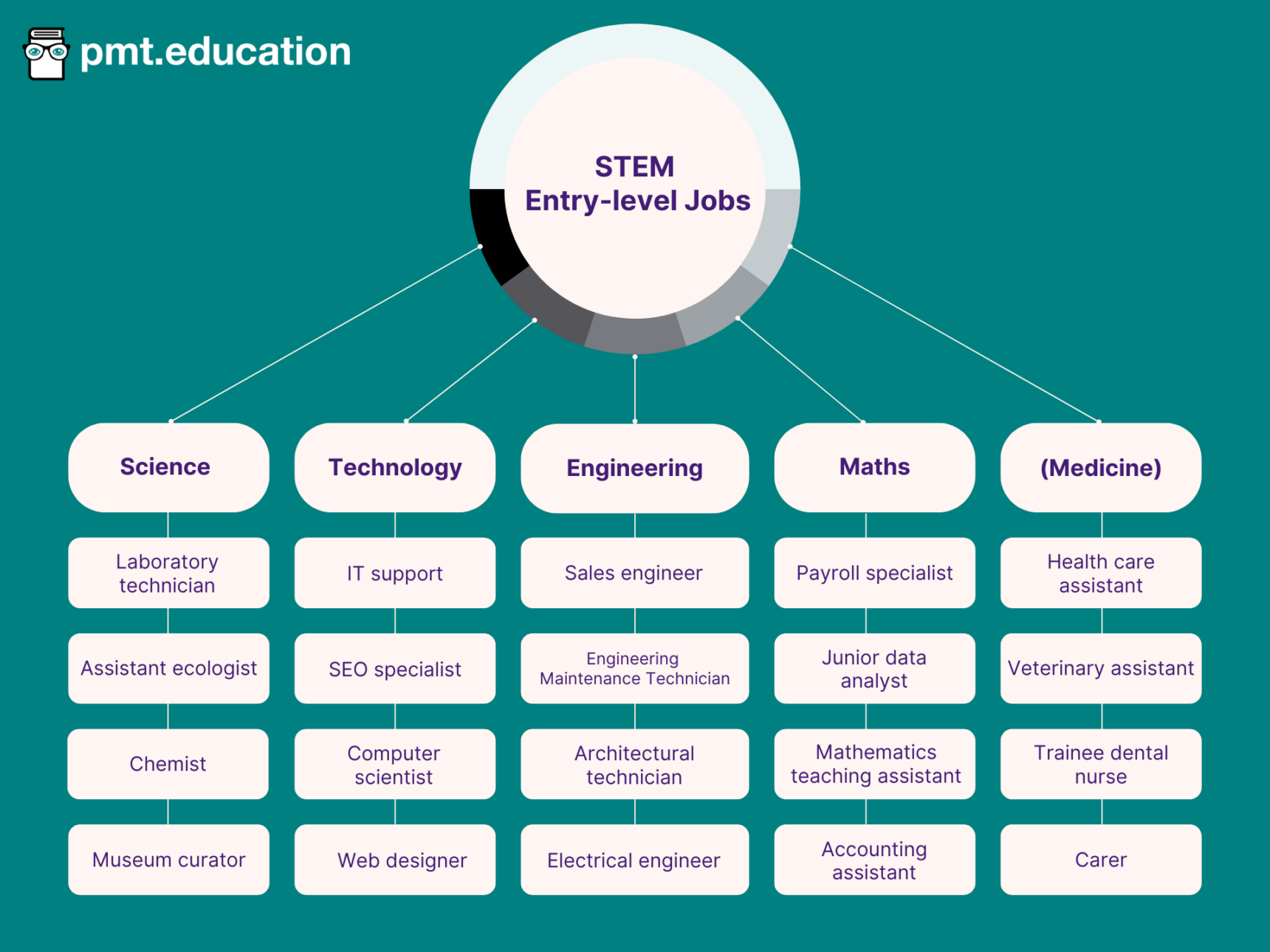Contents:
Age Group: 16+ years
Cost: Earn a wage
Skills Developed: Job-specific practical skills and core industry knowledge
Learning Environment: Workplace
What is an entry-level job?
An entry-level job is a position that doesn’t require a degree and is intended for individuals who are new to the workforce. These jobs often serve as a person’s first professional experience, offering a supportive environment with training and mentorship. Entry-level roles are ideal for those who have recently finished secondary school or are looking for a career change without prior qualifications in their new field. The goal of an entry-level job is to provide the foundation you need to build a successful career in your chosen field.
In STEM, entry-level jobs often focus on developing core skills which underpin a STEM career, such as problem-solving, teamwork, and communication. This is typically achieved by learning from experienced STEM professionals and gaining hands-on experience with industry-specific tools and techniques.
Who can do an entry-level job?
Entry-level typically means you will not need a university qualification, with many employers prioritising attitude, work ethic, and potential over a formal education. However, in STEM, entry-level jobs will often require secondary STEM qualifications. These include GCSEs, A Levels, IB programmes, NVQs, BTECs, Apprenticeships, and T Levels.

Benefits of an entry-level job
If you take on an entry-level job in STEM, it’s important that you are genuinely enthusiastic about the field it is in and willing to learn. In return, entry-level jobs can benefit you greatly in the following ways:
- Immediate income: Start earning a wage right away. This is particularly beneficial if you’re looking to save up for future studies.
- Practical experience: Gain hands-on experience in your chosen field, which can be invaluable in STEM where technical skills are highly valued.
- Supportive environment: Obtain guidance and help from employers who understand that you are new to the workforce.
- Networking: Build connections in the industry, which can be beneficial even before further education. See our STEM careers article for more on networking.
- Career progression: Progress gradually by taking on more responsibility and setting the stage for future career growth.
What entry-level jobs are there in STEM?
Entry-level STEM jobs span a wide range of disciplines and roles. The list below shows some examples of entry-level opportunities across various disciplines.

What are entry-level remote jobs?
Entry-level remote jobs in STEM are becoming increasingly popular, especially in fields like IT, data analysis, and digital marketing. These roles offer the flexibility to work from home, either full-time or in a hybrid arrangement. While there is ongoing debate about whether the shift to remote work is disadvantageous to more junior employees, these positions can provide greater practical benefits. The table below summarises the key pros and cons of remote work for entry-level jobs.
How to find entry-level STEM jobs
The ways in which you can find an entry-level job in STEM are much like those for any STEM job. Our article on how to get into STEM provides a detailed guide on these methods, including online research, networking, and proactive job hunting. It also provides strategies for narrowing down the vast range of opportunities to those that best match your interests and skills.
To streamline your search for entry-level STEM jobs, you can tailor traditional job search methods to focus specifically on entry-level positions:
- Job boards: Use keywords like “junior,” “assistant,” “starter,” or “entry-level” to filter your search on job websites. Many of these platforms also allow you to search specifically for entry-level remote jobs. There are also websites which specialise in advertising entry-level jobs alone, such as youth employment UK.
- Company websites: Certain companies specialise in providing entry-level jobs or early career opportunities, such as the Environment Agency, Careers in eyecare, and School of Thought Automotive.
- Speculative applications: This approach can be particularly effective for these entry-level jobs. Check out our LinkedIn advice, attend careers fairs, or reach out to companies directly via their human resources or talent acquisition departments to enquire about potential opportunities. Make sure to include all necessary application materials, such as your CV and cover letter, to demonstrate initiative and minimise back-and-forth communication.

How to apply for an entry-level job
Applying for an entry-level job in STEM follows a similar process to applying for any STEM position, so you can refer to our article on applying for STEM careers for guidance. However, without the same qualifications as recent university graduates entering the workforce, you might wonder: how do you apply to jobs with no experience?
How to write your first CV with no experience?
If you have read our applying for STEM careers article, you will know that a CV is a key part of a STEM job application, including entry-level positions. Without a degree, your education section may look brief, but you can compensate for this by highlighting other relevant learning experiences.
For jobs that don’t require a degree, it is important to remember that you do have valuable experience to showcase. This experience might include work placements, mentorship programmes, summer schools, and volunteering.
Top tips for writing a standout CV for entry-level STEM jobs
- Focus on transferable skills: Highlight experiences from outside of your secondary qualifications that demonstrate skills valuable to STEM employers. Reflect on these experiences to connect your experiences with skills relevant to the field.
- Include experiences outside of school: Any relevant experience is valuable. Mention hobbies, games, or activities that have helped you develop skills important to the role. Ensure you explain how these experiences contribute to your suitability for the job.
- Include experiences in school: Incorporate any STEM-related coursework, projects, or event days. Describe what you learnt from these experiences and how they relate to the field you are applying to.
- Show enthusiasm: Employers seek candidates who are eager to learn and passionate about the field. Convey your enthusiasm both in your CV and cover letter to demonstrate your potential and commitment to the role and the industry.
Entry-level job interviews
As entry-level jobs are intended for individuals who don’t have a degree or extensive experience, many applicants will have limited interview experience. Interviewers understand this and don’t expect perfection. They simply want to see that you have prepared as well as possible.
To get ready for your first interview, read our advice on STEM interviews and practise with carers, friends, and teachers. Additionally, doing multiple interviews can help you gain confidence and improve your interview skills, all while improving your chances of landing your first job!
Top tips for your first interview
- Research the company: Understand the company’s goals, values, and the specific role you’re applying for. This will not only help you tailor your answers but also show that you’re genuinely interested in the position.
- Practise common interview questions: Be ready to discuss your strengths, weaknesses, and why you’re interested in the role. Practise answering these questions confidently and succinctly.
- Prepare questions: Asking thoughtful questions shows that you’re serious about the job and the company. Consider asking about the company’s approach to training and development.
Alternatives to entry-level jobs
There are many alternatives to entry-level jobs that also offer a direct route from secondary education into a STEM career without requiring further education:
Internships
Internships are short-term positions that provide practical experience in a particular field. Internships can last from a few to several months and provide an opportunity to gain hands-on experience and industry knowledge. For those with learning difficulties or disabilities, supported internships are also available.
You can find STEM internships on websites such as Grad Cracker or by reaching out to companies directly.

School leaver’s programmes
School leaver’s programmes are structured courses which directly introduce you to a long-term role within a company. These programmes usually include a combination of on-the-job training and formal learning, providing a clear pathway to a permanent position. They often involve mentoring and support to help you adjust and develop within the company. These programmes are ideal if you’re looking for a role that provides immediate employment and development opportunities.
Traineeships and apprenticeships
Training programmes and apprenticeships are very similar in that they both equip you with the skills needed for a specific job role, introducing you to formal employment in a particular STEM career while providing support and training courses. However, traineeships, which are often listed alongside apprenticeships on government websites, differ in that they are shorter, unpaid, and more focused on job readiness. They also offer additional support in maths and English, making them a good choice for those needing to improve these essential skills.
It should be noted that traineeships are no longer delivered through the national traineeships programme, but can still be offered by providers locally. To learn more and to apply, see the government webpage on traineeships.
To help you determine which option best fits your STEM career goals, we’ve created the comparison table below.
Entry-level jobs offer a valuable starting point for those eager to begin their careers in STEM. These positions provide a practical introduction to the field, allowing individuals to earn a wage while gaining essential hands-on experience and industry knowledge. Although these roles might not require a degree, they often need secondary STEM qualifications and a genuine enthusiasm for the field.
Entry-level roles are designed to support and guide newcomers, offering a supportive environment where you can develop core skills and build a foundation for future career growth. By engaging in these positions, you not only start building your professional network, but also set yourself up for continued advancement in the STEM industry. Whether through in-person or remote roles, the key is to approach each opportunity with a readiness to learn.
Interested in starting your career while earning a degree? Read on to our next article to learn all about degree apprenticeships.

Comments